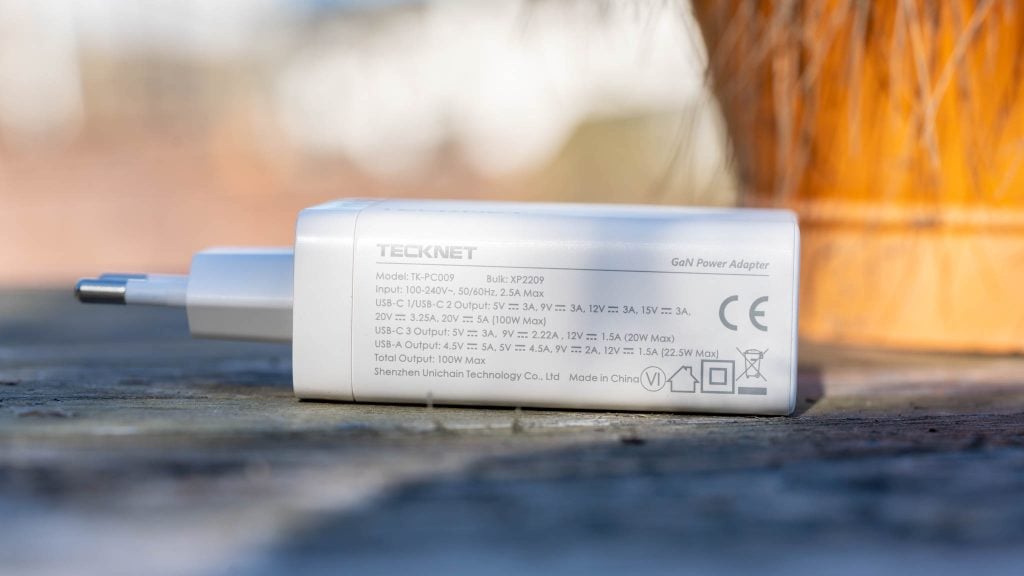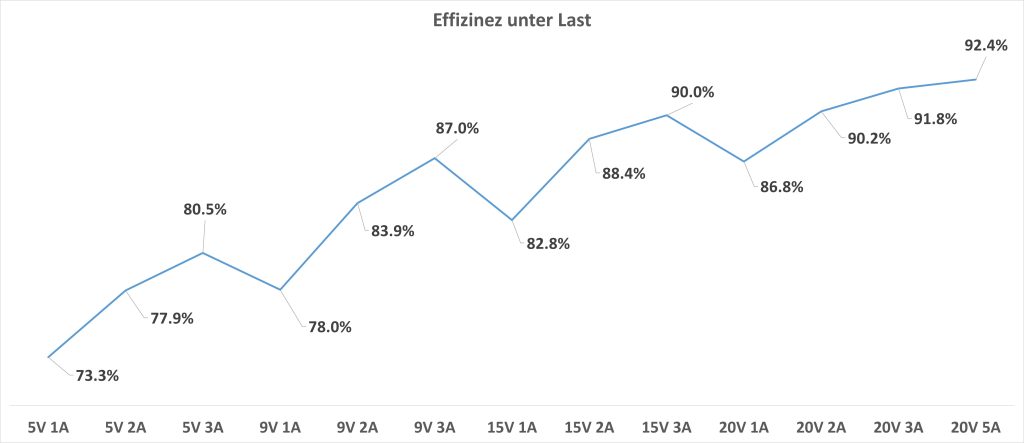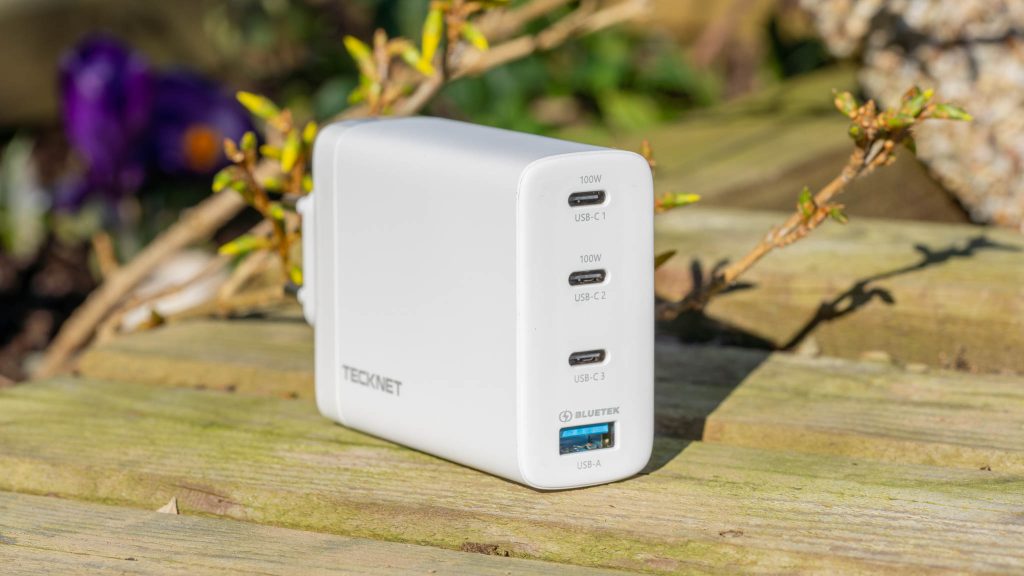A good USB charger can be a blessing in everyday life! What makes a good USB charger? In practice, usually the mixture of high performance and as many ports as possible. If the charger is then qualitatively still decent and does not fly around your ears, this is of course also an advantage.
Exactly such a good USB charger wants to be the TECKNET TK-PC009! This offers 100W power, 3x USB C and 1x USB A.
Actually, a very nice combination of ports! But how does it look in practice? Is the TECKNET TK-PC009 as good as we hope it will be? Let’s find out in the test!
The TECKNET TK-PC009 in the test
With 75 x 60 x 29 mm the TECKNET TK-PC009 is pleasantly compact for a USB charger with 100W!
At the same time, it does not look unrealistic, compact or light. This looks pleasantly „dense“ and solid, as befits a good charger. The general workmanship is also pleasingly good! The charger makes a high-quality impression.
It relies on the plug-in power supply form factor, which is ideal for traveling. However, this form factor is not ideal at the desk.
Connections of the TECKNET TK-PC009
The TECKNET TK-PC009 has three USB C ports and one USB A port.
USB C 1 / 2 – USB Power Delivery 100W – 5V/3A, 9V/3A, 12V/3A, 15V/3A, 20V/5A
USB C 3 – USB Power Delivery 20W – 5V/3A, 9V/2.22A, 12V/1.5A
USB A – Quick Charge and Super Charge – 4.5V/5A, 5V/4.5A, 9V/2A, 12V/1.5A.
The 1st and 2nd USB C ports of the charger have 100W power according to the power delivery standard, enough to charge even notebooks.
USB C 3 has 20W, which is usually sufficient for smartphones, and the USB A port relies on a mixture of Quick Charge and „Super Charge“ (for Huawei smartphones).
Maximum 100W
However, the charger can deliver a maximum of 100W across all ports. Thus, you can load USB C 1 or 2 with 100W, but as soon as an additional port is used, the 100W ports are throttled.
| USB C 1 | USB C 2 | USB C 3 | USB A |
| 100W | |||
| 100W | |||
| 20W | |||
| 22,5W | |||
| 65W | 30W | ||
| 65W | 20W | ||
| 65W | 22,5W | ||
| 45W | 30W | 20W | |
| 65W | 20W (geteilt) | 20W (geteilt) | |
| 45W | 30W | 20W (geteilt) | 20W (geteilt) |
This throttling is „static“. It does not matter how much energy a device really needs. As soon as a port is occupied, the „static“ throttling occurs.
With PPS
The TECKNET TK-PC009 supports the PPS standard on both primary USB C ports. Interestingly, port 1 and 2 have different PPS levels.
USB C 1 – 3.3-11V at 3A
USB C 2 – 3,3-11V at 5A
Exciting! Thus, the USB C 2 port is noticeably better suited than USB C 1, especially for the Samsung Galaxy S „Ultra“ series.
PPS stands for Programmable Power Supply. The normal USB Power Delivery offers your smartphone several voltage levels, mostly 5V, 9V, 15V and 20V. Here it can choose one level and charge with it. PPS now allows your smartphone to freely choose a voltage within a certain range, for example 3.3-16V. If your smartphone thinks it would be ideal to charge with 6.5V, then a PPS charger can supply it with 6.5V.
Some smartphones like the Samsung S20/S21/S22/S23 series models require PPS to reach full charging speed, see here charging the S23 Ultra. An S23 Ultra can charge at a maximum of 14W on a normal USB PD charger, and 45W on a PPS charger. If your smartphone does not support PPS, it will simply ignore this feature and treat the charger as a normal USB PD charger.
Load test
I loaded the charger with 100W for about 6 hours. Fortunately, the charger was able to deliver the 100W consistently over this period.
We did have some noticeable heating, but nothing out of the ordinary.
Charging speed
| Loading speed to be expected | |
| Apple iPads | +++ |
| Apple iPhones | +++ |
| Apple MacBooks | +++ |
| Google Pixel | +++ |
| Huawei Smartphones | ++ |
| OnePlus Smartphones | + |
| Realme Smartphones | + |
| Samsung Galaxy Smartphones („S“ Serie) | +++ |
| Windows Notebooks (Dell XPS, ASUS usw.) | +++ |
+++ = „perfect“ maximum possible charging speed to be expected
++ = very high charging speed to be expected
+ = expect a fast charging speed
0 = expect „standard“ charging speed
– = slow charging speed to be expected
— = not compatible or only suitable to a very limited extent
The combination of „up to 100W“ in USB Power Delivery standard and PPS makes the TECKNET TK-PC009 ideal for very many devices. So you can charge most MacBooks at full speed (except the models with 140W) on the charger. The same applies to many Windows notebooks.
But you can also charge smartphones on the 100W ports without any problems. Don’t worry, there can be no „overcharging“ or too fast charging here. You can easily charge an iPhone 14 Pro or iPad at the 100W USB C ports at full speed.
Thanks to PPS with an „up to 5A“ range, the TECKNET TK-PC009 is also fully suitable for Samsung S Ultra smartphones.
Voltage stability
Actually, voltage stability is less of a problem with modern USB chargers, but let’s take a quick look to make sure that all voltages of the primary USB C port are within the limits.
The voltage stability of the TECKNET TK-PC009 is good so far. Not outstanding, but not bad by any stretch of the imagination!
Efficiency under load
Let’s take another look at the efficiency of the TECKNET TK-PC009.
The charger’s efficiency varies between 73.3% and 92.4%. The 73.3% at low load is nothing special. I usually prefer to see values above 80% here, but it is not abnormal for powerful multiport chargers that we see slightly worse values at very low load.
73.3% is still OK here. The 92.4% at full load is even very good!
Summary
The TECKNET TK-PC009 is a good USB-C charger, I can not say otherwise! There is nothing against this charger, quite the opposite!
We have 2x 100W USB C ports, but you can only fully use one port at a time, 1x 20W USB C and a handy 22.5W USB A port.
Technically, the charger is impeccable! We have a good to very good efficiency (up to 92.4%) and a decent voltage stability.
Thanks to the mixture of 100W USB C Power Delivery and PPS, the charger is well suited for almost all current devices. You have a MacBook Pro? No problem! You have an iPhone? Perfectly suitable! You have a S23 Ultra? Then the charger is also sufficient for the full charging speed!
In short, you can buy the TECKNET TK-PC009 without hesitation!
- 【100W 4-in-1 USB C Ladegerät】 Der USB-C1/C2-Anschluss des...
- 【Klein aber Leistungsstark】 Das 100W USBC Schnellladegerät...
- 【Sicherheitsschutz】 Das 100W USB C Stecker verfügt über...
- 【Breite Kompatibilität】 Das Schnellladegerät usb c...
- 【2023 GAN-Technologie der neuen Generation】 Das 100 W Power...












